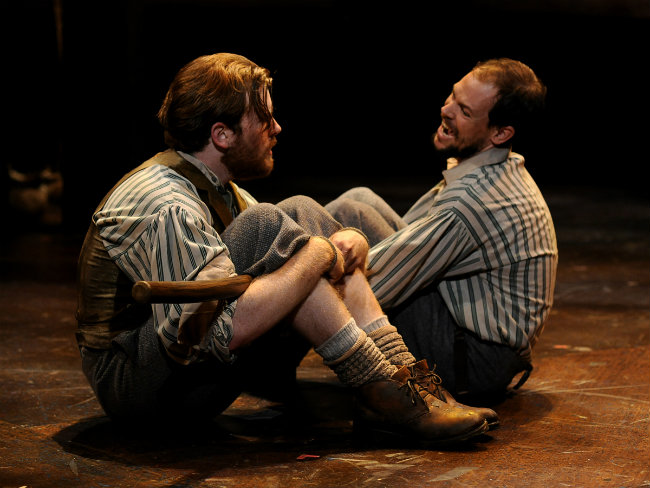Review: The San Patricios at Solvang Festival Theater
José Cruz Gonzáles’s Historical Drama Made World Premiere Last Week

The fact that history is written in self-serving ways by the victors does not mean other perspectives die. Like seeds, they wait out of sight for their day, if not of justice, then at least acknowledgement and humane understanding. Such is the guiding premise behind PCPA’s wonderful world premiere, José Cruz Gonzáles’s The San Patricios, which portrays the Mexican-American War from the standpoints of people caught up in the fighting. The play takes its name from the battalion of St. Patrick, a group of some 200 American immigrants of European descent, mostly Irish, who enlisted in the military for dire economic reasons, but during the campaign defected and joined the Mexican forces. This artillery regiment proved to be a formidable foe, and after the war most of the remaining San Patricios were hung as traitors in a cruel demonstration by the U.S. military. Mexico, on the other hand, as one might guess, celebrates the San Patricios as heroes and patriots. But between these two monoliths of reductionism fall the lives of actual people into complex folds of ambiguity, the conflicting pull of identity, national loyalty, religious fidelity, and dire survival.
Structurally, the play follows three stories: Jaun (Kevin Rico Angulo), a Mexican soldier, and his strong-headed sister Ofelia (Anna Lamadrid) — who disguises herself as a man to join the fighting; an Irish couple, Matthew (Paul Henry) and Mary Casey (Megan C.C. Walker) — she also joins the fighting in disguise; and Irishmen Samuel (Jim Goza), Joseph (Mike Fiore) and Liam (understudy Benjamin McNamara) — two brothers and a cousin who also enlist. These strands inevitably coalesce for the final stand of the San Patricios against the U.S. that led to defeat and capture.
Beyond the script, other production assets include authentic and drab peasant costumes and a suggestive gallows set piece that hangs, like fate, over the entire drama. Atmosphere is enhanced by the incidental music of Daniel Valdez and adaptations of traditional Mexican and Irish tunes. Historical context is delivered by a cheeky playwright’s risk — that is, the United States’ and Mexican presidents, James Polk (Eric Stein) and Santa Anna (Leo Cortez), regularly take the stage, caricatured as circus masters, cunningly driving wag-the-dog warfare for political gain and ego gratification. The two manipulate events like puppet masters, vie to outwit one another, and engage in games and cock-fighting (Santa Anna was a lifelong compulsive gambler). Gonzáles, of course, has constructed straw effigies here, selecting and bending facts to suit his purposes. But the whole point of this play is to hear the voices of the voiceless, and with that democratic motivation in mind, who can blame him for shifting the focus and blurring the big guy for a change?



